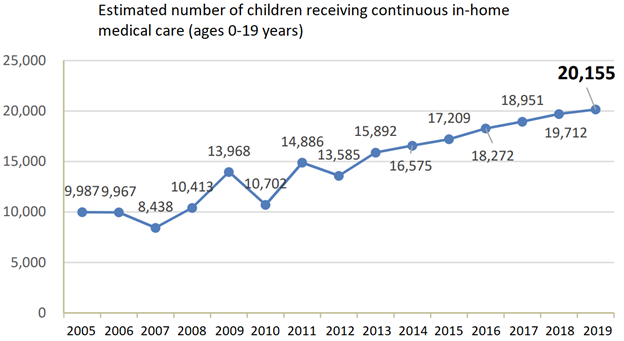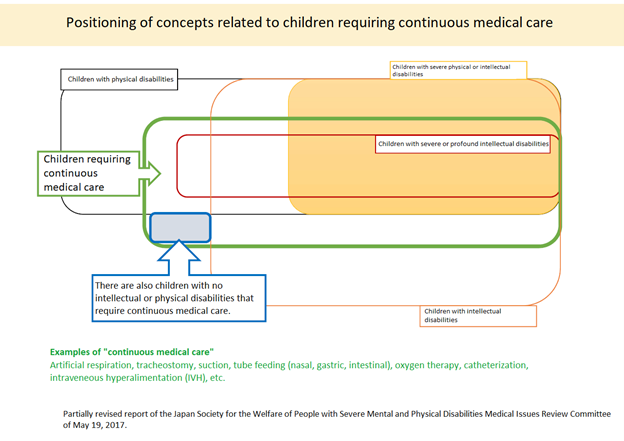[HGPI Policy Column] No.23 – From the Child Health Team – Child Health Column 3 – The Act on Support for Children Requiring Continuous Medical Care and Their Families comes into effect this September
date : 8/25/2021
Tags: Child Health, HGPI Policy Column
![[HGPI Policy Column] No.23 – From the Child Health Team – Child Health Column 3 – The Act on Support for Children Requiring Continuous Medical Care and Their Families comes into effect this September](https://hgpi.org/en/wp-content/uploads/sites/2/column-top-childhealth-1.jpg)
Key points
– The Act on Support for Children Requiring Continuous Medical Care and their Families (tentative translation; official title TBD) is planned to come into effect on September 18, 2021.
– The number of children requiring continuous medical care has increased as medical technology has advanced, making the creation of an environment in which these children can access adequate support an important issue. This led to the enactment of the Act on Support for Children Requiring Continuous Medical Care and their Families.
– When this act comes into effect, expectations are high for its foundational concepts to state the need for all of society to support the daily lives of children requiring continuous medical care and the need to ensure such children can receive adequate and equal support regardless of where they reside. Expectations are also high for the support it will provide to their families.
On June 11, 2021, the Act on Support for Children Requiring Continuous Medical Care and their Families was passed by a plenary session of the House of Councillors. *1 In this column, we would like to introduce the background of this act, the purpose of its legislation, and our future expectations.
Defining “medical care” and “children requiring continuous medical care”
Here, “medical care” refers to “acts of daily living support that are of a medical nature and are necessary for everyday life.” These acts include respiratory management with ventilators or sputum suctioning, and are distinguished from medical activities performed by certified medical personnel. “Children requiring continuous medical care” are those with serious disabilities who require this form of care in a continuous manner for everyday living at home or in society (Figure 1). In this context, “children” are defined as people below age 18 or people age 18 or above and enrolled in a secondary school. According to a report from the Subcommittee for People with Disabilities of the Ministry of Health, Labour and Welfare (MHLW) Social Security Council, there were approximately 20,000 of these children in Japan as of 2020, and their numbers have been increasing rapidly, particularly in recent years (Figure 2). *2 *3
Figure 1 (Reference: MHLW Working Group on Community Inclusion for Children with Intractable Diseases and Specified Chronic Diseases, October 1, 2019. Document 2-1: Measures for Children Requiring Continuous Medical Care.)

Figure 2 (Reference: 112th Meeting of the MHLW Social Security Council Subcommittee for People with Disabilities, June 21, 2021. Document 7: The Act on Support for Children Requiring Continuous Medical Care and Their Families.)
Background to the enactment of the Act on Support for Children Requiring Continuous Medical Care and Their Families
Alongside recent progress in medical science and technology, more lives being saved in neonatal intensive care units (NICU) and other facilities, even infants that are very premature, and the number of children who require continuous medical care has increased from an estimated 9,987 in 2005 to 20,155 in 2019. More and more children are living in communities while receiving continuous in-home care with devices like ventilators and feeding tubes, so there is a growing need to resolve the various issues accompanying this trend. For children receiving continuous medical care to be able to live in their communities with peace of mind, it will be essential to provide them with pediatric medical care and in-home care as well as with aid from disability welfare services. However, in the past, healthcare services have been the main source of care for these children. This means development on systems and collaborative practices involving the fields of welfare, healthcare, childcare, and education is behind. In that context, during a review of the Services and Supports for Persons with Disabilities Act in 2016, the Act on the Comprehensive Support for the Daily and Social Life of Persons with Disabilities and the Act on the Partial Amendment of the Child Welfare Act were enacted, a legal definition of “children requiring continuous medical care” was created, and prefectural and municipal governments were obligated to make efforts to establish systems for communication and coordination with support organizations in medicine, welfare, health, childcare, and education. This was a major turning point for efforts to reinforce support for children who require continuous medical care. [4]
However, according to the MLHW FY2019 Project for the Promotion of Comprehensive Welfare for Persons with Disabilities “Survey on Living Conditions of Children Requiring Continuous Medical Care and Their Families” Report,[1] *5 providing continuous care has been the source of problems in everyday life for these children and their families. In addition to “I cannot secure a spot in a nursery school” and “There is nowhere I can take my child to be looked after,” these issues also included the need to be accompanied by a guardian to go to school.
Against this backdrop, the “Act on Support for Children Requiring Continuous Medical Care and their Families,” which was drafted by a bipartisan group, was passed by a plenary session of the House of Councillors on June 11, 2021.
Expectations for the enactment of the Act on Support for Children Requiring Continuous Medical Care and their Families
The Act on Support for Children Requiring Continuous Medical Care and their Families comes into effect on September 18, 2021. Its basic concepts are to provide support for the daily and social living of children requiring continuous medical care from all of society and to ensure they receive equal and appropriate support regardless of where they live. It will obligate the national Government and local governments to provide this support. Operators of day care centers and schools will also be obligated to take measures to provide support through measures including the placement of nurses or nursery teachers who can operate medical devices such as for sputum suctioning in day-care centers, or the placement of nurses or other healthcare professionals in schools. It also mentions expanding the education system and implementing necessary measures to ensure children requiring continuous medical care can receive appropriate medical care and other support without having their guardians present. Furthermore, each prefecture will be obligated to establish Support Centers for Children Requiring Continuous Care to expand the consultation and support system for children requiring continuous care and their families. Their role will be to provide these children and their families with consultation, information, advice, and other forms of support. These centers will also provide information and training to relevant organizations in medical care, health, welfare, education, and labor.
In the past, there have been reports of cases in which children were required to be accompanied by a guardian at all times or when commuting to and from school, regardless of the severity of their condition. We have high expectations for the Act on Support for Children Requiring Continuous Medical Care and their Families to reduce the burden on families. We also hope that providing expanded social support for children requiring continuous medical care will improve our systems for building more inclusive communities throughout society.
[1] Conducted by Mitsubishi UFJ Research and Consulting Co., Ltd.
Works referenced
*1: Ministry of Health, Labour and Welfare. Official Gazette No. 138. June 18, 2021.
*2: Ministry of Health, Labour and Welfare. Concerning the Promulgation of the Act on Support for Children Requiring Continuous Medical Care and Their Families, Announcement No. 742, 3 MEXT Announcement No. 499, Health Policy Bureau Announcement No. 0618-1, Child and Family Policy Bureau Announcement No. 0618-1, Department of Health and Welfare for Persons with Disabilities Announcement No. 0618-1. June 18, 2021.
*3: Ministry of Health, Labour and Welfare, 112th Meeting of the Social Security Council, Committee on Persons with Disabilities, Document 7, Concerning “The Act on Support for Children Requiring Continuous Medical Care and Their Families.” June 21, 2021.
*4: Ministry of Health, Labour and Welfare. FY2009 Joint Meeting of Parties Responsible for Building Community Support Systems for Children Requiring Continuous Medical Care, etc.: Steps for Enhancing Support for Children with Disabilities Requiring Continuous Medical Care.
*5: Mitsubishi UFJ Research and Consulting Co., Ltd., FY2019 Ministry of Health, Labour and Welfare Project for the Promotion of Comprehensive Welfare for Persons with Disabilities. Survey on Living Conditions of Children Requiring Continuous Medical Care and Their Families” March 2020 Report.
About the author
Motoki Tamura (Program Specialist, HGPI / Doctoral Student, Community Health & Preventive Medicine Department, Hamamatsu University School of Medicine)
HGPI Policy Column (No.22) -from the Dementia Policy Team- >
Top Research & Recommendations Posts
- [Policy Recommendations] The Path to a Sustainable Healthcare System: Three Key Objectives for Public Deliberation (January 22, 2026)
- [Research Report] The 2025 Public Opinion Survey on Healthcare in Japan (March 17, 2025)
- [Research Report] Perceptions, Knowledge, Actions and Perspectives of Healthcare Organizations in Japan in Relation to Climate Change and Health: A Cross-Sectional Study (November 13, 2025)
- [Policy Recommendations] Reshaping Japan’s Immunization Policy for Life Course Coverage and Vaccine Equity: Challenges and Prospects for an Era of Prevention and Health Promotion (April 25, 2025)
- [Research Report] The 2023 Public Opinion Survey on Satisfaction in Healthcare in Japan and Healthcare Applications of Generative AI (January 11, 2024)
- [Research Report] AMR Policy Update #4: Cancer Care and AMR (Part 1)
- [Public Comment Submission] “Assessment Report on Climate Change Impacts in Japan (Draft Overview)” (December 24, 2025)
- [Policy Recommendations] Developing a National Health and Climate Strategy for Japan (June 26, 2024)
- [Research Report] The Public Opinion Survey on Child-Rearing in Modern Japan (Final Report) (March 4, 2022)
- [Research Report] Survey of Japanese Physicians Regarding Climate Change and Health (December 3, 2023)
Featured Posts
-
2026-01-09
[Registration Open] (Hybrid Format) Dementia Project FY2025 Initiative Concluding Symposium “The Future of Dementia Policy Surrounding Families and Others Who Care for People with Dementia” (March 9, 2026)
![[Registration Open] (Hybrid Format) Dementia Project FY2025 Initiative Concluding Symposium “The Future of Dementia Policy Surrounding Families and Others Who Care for People with Dementia” (March 9, 2026)](https://hgpi.org/en/wp-content/uploads/sites/2/dementia-20260309-top.png)
-
2026-02-05
[Registration Open] (Webinar) The 141st HGPI Seminar “Current Status and Future Prospects of Korea’s Obesity Policy: Voices of People with Lived Experience in Policy Promotion” (March 3, 2026)
![[Registration Open] (Webinar) The 141st HGPI Seminar “Current Status and Future Prospects of Korea’s Obesity Policy: Voices of People with Lived Experience in Policy Promotion” (March 3, 2026)](https://hgpi.org/en/wp-content/uploads/sites/2/hs141-top-1.png)
-
2026-02-06
[Research Report] AMR Policy Update #5: Cancer Care and AMR (Part 2)
![[Research Report] AMR Policy Update #5: Cancer Care and AMR (Part 2)](https://hgpi.org/en/wp-content/uploads/sites/2/HGPI_20260204_AMR-Policy-Update-5.png)





